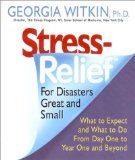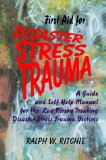Identifying Disaster Stress Reactions
Experiencing a disaster can be overwhelming. Even when one has avoided the numerous physical challenges and dangers of a disaster, the psychological threats are often harder to identify, evaluate and address. These threats can serious degrade your ability to cope with the disaster and its ongoing situations, as well as result in lingering psychological issues well after the actual disaster has subsided. As with most dangers, the first and best defense is the ability to identify them.
The following are some common types of Disaster Stress Reactions, categorized by type:
Psychological/Emotion
- Anxiety
- Irritability, restlessness, over excitability
- Depression, moodiness, crying
- Anger, blaming
- Feelings of apathy, diminished interest in usual activities
- Feelings of isolation, detachment, estrangement
- Feelings of guilt about surviving
- Denial or constriction of feelings
- Flashbacks or unwelcome memories of the disaster
- An exaggerated reaction to being startled
- Recurrent nightmares about the disaster or about other traumatic events
- Inability to fall or stay asleep
- Sleeping excessively
Mental/Thought
- Poor concentration
- Mental confusion
- Slowness of thought
- Inability to express yourself verbally or in writing
- Forgetfulness
- Inability to make judgments and decisions
- Loss of ability to think of alternatives or prioritize tasks
Behavioral/Social
- Hyperactivity
- Outbursts of anger or frequent arguments
- Loss of objectivity
- Withdrawal, social isolation, distancing yourself from others
- Increased use of alcohol, tobacco, or other drugs
- Avoidance of activities or places that remind you of the disaster
- Family problems
If any of these symptoms affect your ability to function, seek medical attention from your doctor or a mental health provider familiar with the effects of disasters. Some people may never have a reaction.
Others may have delayed reactions that can show up days, weeks, or even months after the disaster happens. Not everyone has reactions right away. These symptoms may go and then come back again when something makes you think about the disaster.
After a disaster, be sure to talk to someone about how you are feeling: a member of the clergy, a counselor, or someone in the Employee Assistance Program provided by your employer. Also, the Red Cross has disaster mental health professionals who can help you deal with the stress related to your disaster experience.
Remember that service animals may also suffer emotional trauma. Get their daily routine back to normal as soon as possible. This will make it easier for them to serve you as before.
Know how a disaster may affect your independence
You are used to being in a certain environment. However, a disaster can change your ability to deal with this environment. It is important that you anticipate for your lowest level of functioning for your personal disaster plan. Your condition may become worse because of physical or emotional reactions to stress. For example, people who do not need the aid of devices on a daily basis may need a wheelchair after a disaster.
After a disaster, you may need to ask for help to do things you usually would have done independently. Understandably, this may make you feel especially vulnerable. You may need help putting your home back in order, filling out forms, or providing documentation and information to disaster relief agencies. This can add to the stress you may be feeling.
Additional Research:
   |
Leave a Reply